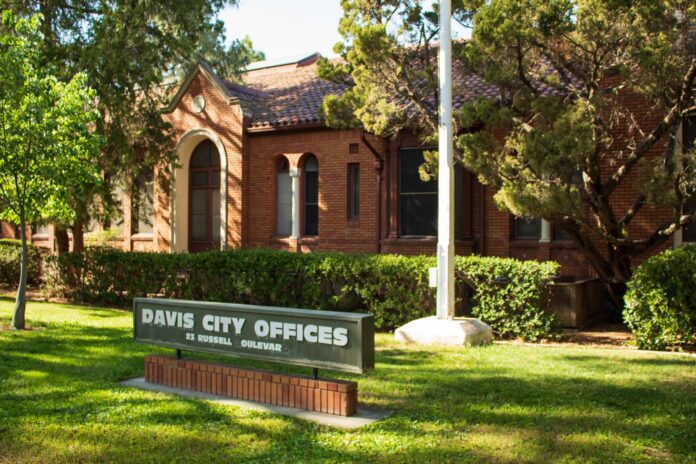The Yolo County Housing Authority and City of Davis are planning to attempt the project again next year with more preparation
By LEVI GOLDSTEIN — city@theaggie.org
The City of Davis, in partnership with the non-profit organization HEART of Davis, opened a temporary shelter for individuals experiencing homelessness at the Davis Migrant Center on Nov. 29, 2021, but it was closed three weeks later due to operational failures.
The Davis Migrant Center, jointly owned by the State of California Department of Housing and Community Development Office of Migrant Services (OMS) and the Yolo County Housing authority, is one of many affordable housing units that specifically houses seasonal agricultural workers and their families during the harvest season, according to Interim Executive Director of Yolo County Housing Sandra Sigrist.
The Interfaith Rotating Winter Shelter, a congregate emergency shelter for people experiencing homelessness, has not been able to operate due to COVID-19 safety concerns, according to Kelly Stachowitz, Assistant City Manager. The Davis Migrant Center, which has individual units and is not occupied during the winter months, was an ideal location for an alternative pop-up shelter project.
Additional shelter for people experiencing homelessness is imperative during the winter, according to Sigrist.
“In the winter it gets cold and it gets down to freezing at night,” Sigrist said. “It is dangerous and unsafe for individuals to be outside[…] We need a way in particular in the winter months to facilitate indoor opportunities.”
With this in mind, Sigrist reached out to the California Department of Housing and Community Development and the City of Davis, and ultimately, the city was given permission by the state to begin the project.
Yolo County Housing and HEART of Davis staff helped the city install heating in the Migrant Center homes to make them habitable during the cold weather. Medical professionals were also employed to provide medical check-ins and other services, according to Stachowitz.
The temporary shelter was only meant to house low-risk individuals overnight, according to Stachowitz.
“This program […] brought individuals from downtown Davis to the site each evening and then took them back to Davis every morning,” Sigrist said. “It wasn’t a 24/7 shelter.”
According to Sigrist, individuals who experience homelessness for longer periods of time and have high support needs or medical issues requiring intensive care are housed in more permanent shelter programs.
Despite its limitations, the shelter was helpful for a number of people experiencing homelessness. However, logistical concerns caused the city to shut down the program early before it was set to be closed at the end of winter. One issue was the lack of staffing, according to Stachowitz.
“HEART of Davis only had a matter of weeks to try to […] put everything together,” Stachowitz said. “Trying to find folks who want to work on this kind of a project on short notice, onboard them, train them, proved to be more difficult than they realized. […] They didn’t have a full complement of staff to be able to manage the program.”
Another complication was the rural location.
“Folks who were participating in the shelter, sometimes they have needs or issues that necessitate a call for service, so a public safety call,” Stachowitz said. “Our police, our firefighters, having to go out to that site multiple times every day, every night, is a drain on resources.”
Sigrist said that the project was not a total failure.
“There was a lot of learning in this first-go round about additional structure and supports that are needed in a program of this intensity and this rural in nature,” Sigrist said. “Everyone’s good intentions have built a model that will keep this program as a potential next year.”
Yolo County Housing and the state are encouraging the City of Davis to attempt the program again.
“Our hope is that if we have ample time to really work with a nonprofit partner, and make sure that we have the staffing in place, well-trained, really good protocols and rules in place so that its very clear what needs to happen and how it needs to happen, that we will be able to have a program in place that serves its purpose,” Stachowitz said.
According to Stachowitz, the grant money that would have been used for the shelter is currently being spent on local hotel costs for emergency beds, where people experiencing homelessness are spending the night and receiving the same medical care they would have at the Migrant Center.
Written by: Levi Goldstein — city@theaggie.org




